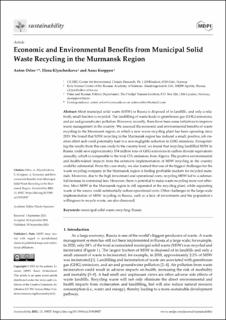| dc.description.abstract | Most municipal solid waste (MSW) in Russia is disposed of in landfills, and only a relatively small fraction is recycled. The landfilling of waste leads to greenhouse gas (GHG) emissions, and air and groundwater pollution. However, recently, there have been some initiatives to improve waste management in the country. We assessed the economic and environmental benefits of waste recycling in the Murmansk region, in which a new waste recycling plant has been operating since 2019. We found that MSW recycling in the Murmansk region has induced a small, positive, job creation effect and could potentially lead to a non-negligible reduction in GHG emissions. Extrapolating the results from this case study to the country level, we found that recycling landfilled MSW in Russia could save approximately 154 million tons of GHG emissions in carbon dioxide equivalents annually, which is comparable to the total CO2 emissions from Algeria. The positive environmental and health-related impacts from the extensive implementation of MSW recycling in the country could be substantial. From this case study, we also learned that one of the biggest challenges for the waste recycling company in the Murmansk region is finding profitable markets for recycled materials. Moreover, due to the high investment and operational costs, recycling MSW led to a substantial increase in communal fees. However, there is potential to make waste recycling more cost effective. Most MSW in the Murmansk region is still separated at the recycling plant, while separating waste at the source could substantially reduce operational costs. Other challenges in the large-scale implementation of MSW recycling in Russia, such as a lack of investments and the population’s willingness to recycle waste, are also discussed. | en_US |

